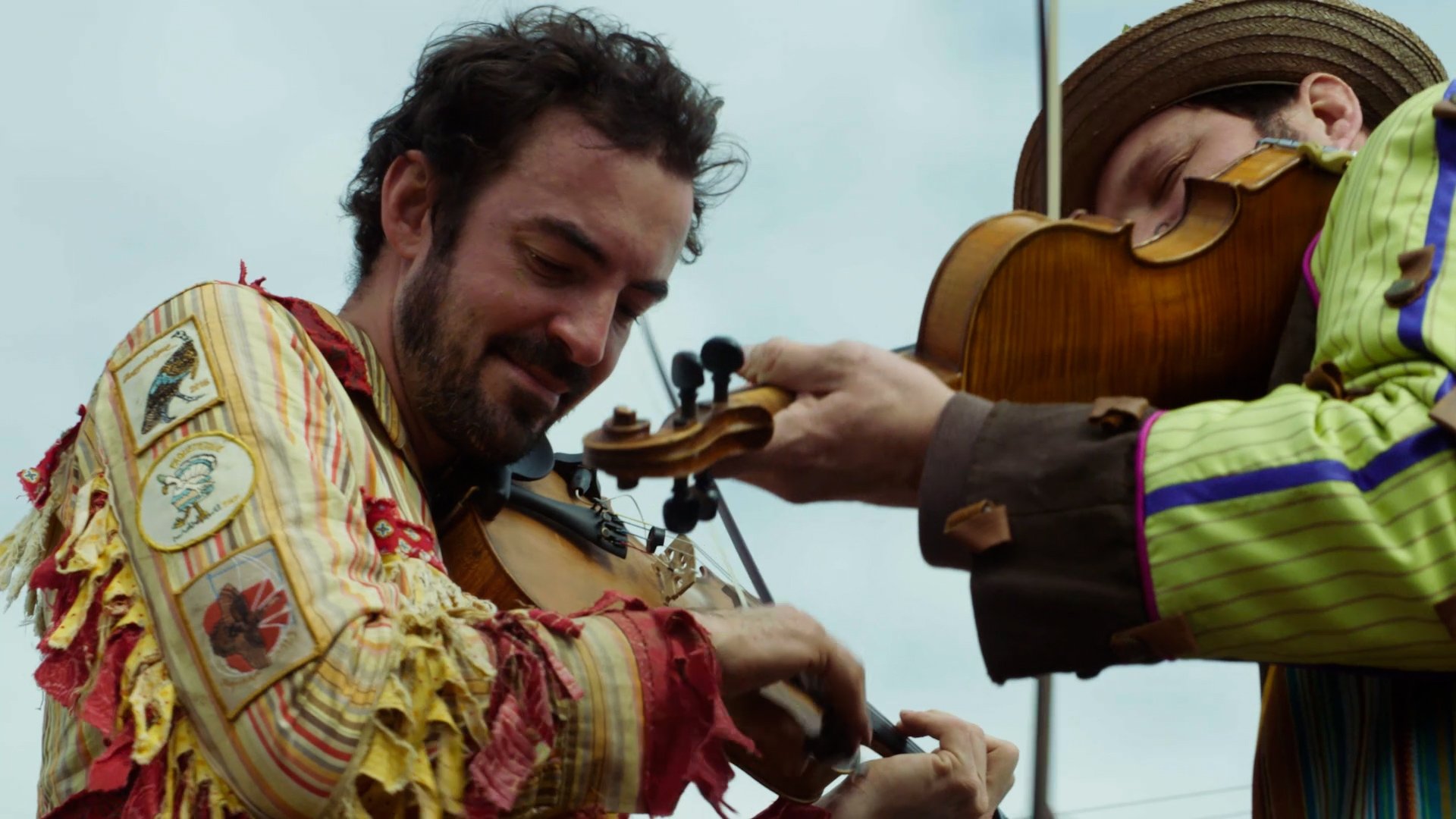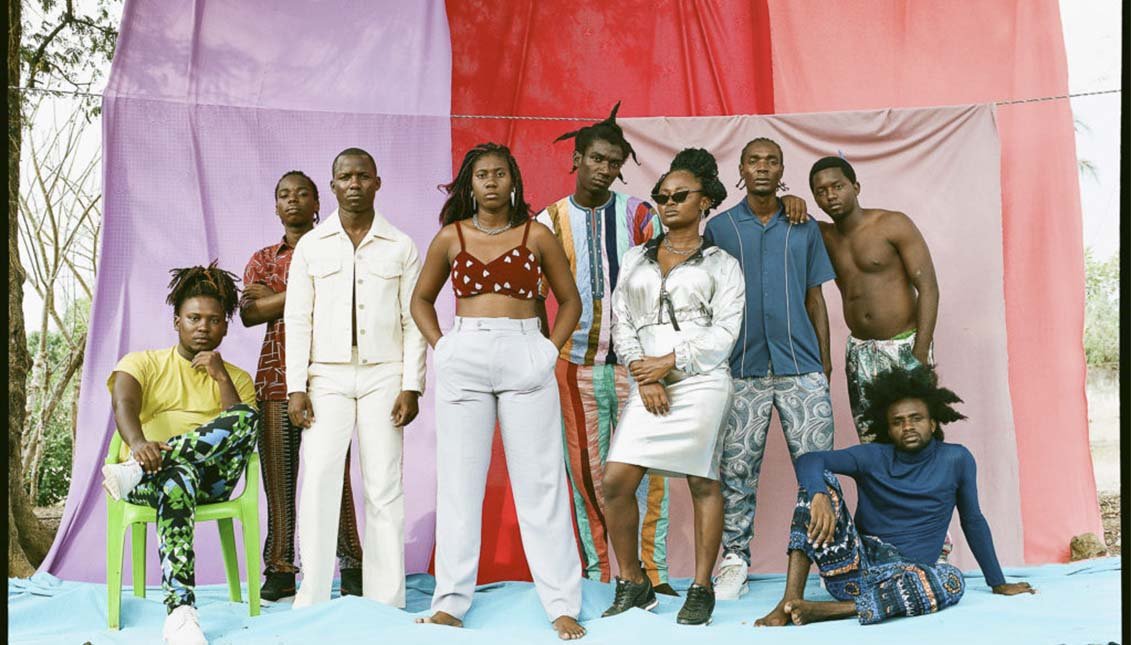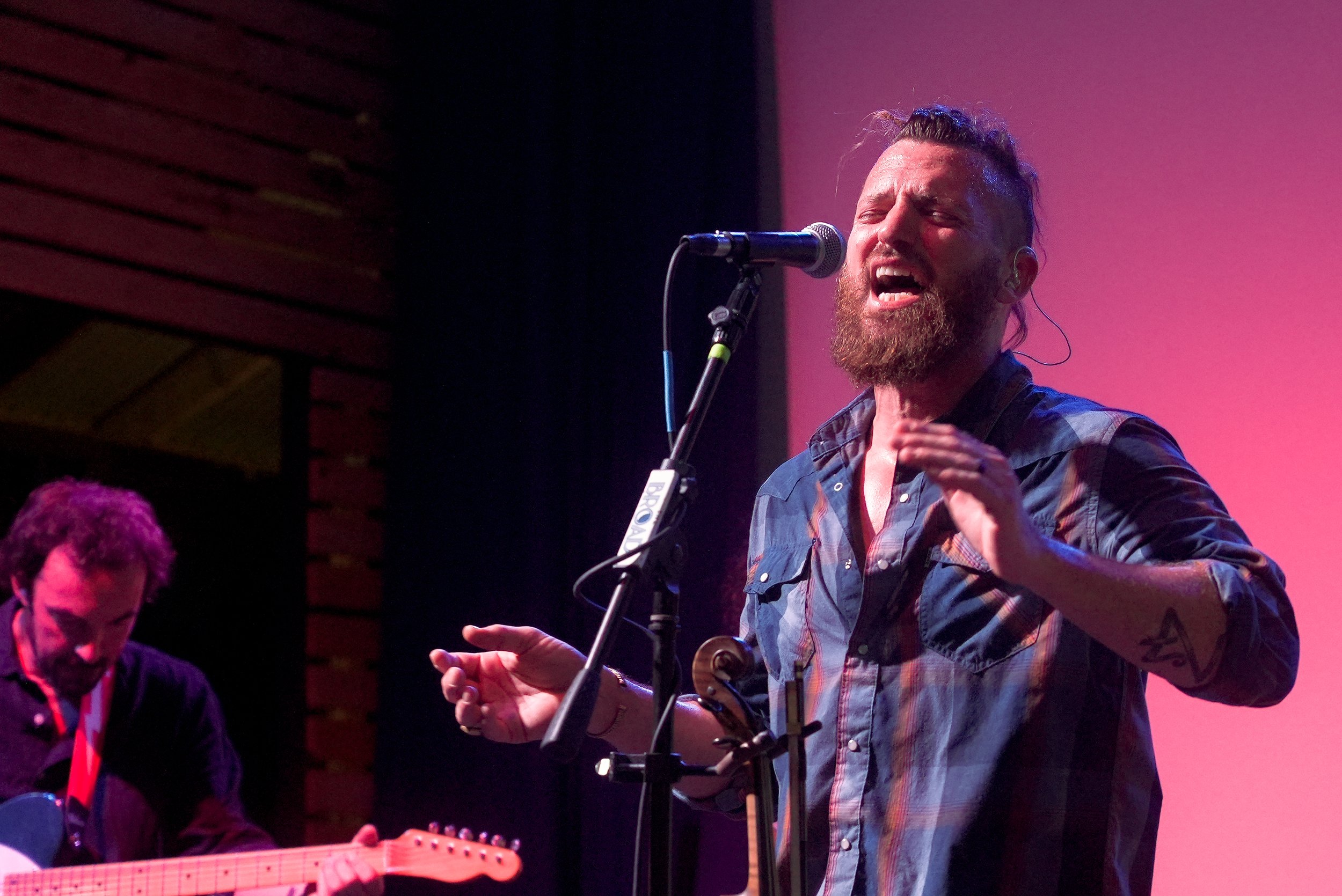The Stars of Cajun Music Doc "Roots of Fire" Play Jazz Fest Before Film Starts Streaming

Joel Savoy in “Roots of Fire”
The documentary benefited from the time it took, and it starts streaming after Jazz Fest on May 7.
[Updated] “Most of it was shot then.”
Jeremey Lavoi and Abby Berendt Lavoi are trying to work out the timeline for Roots of Fire, their documentary on the younger generation of Cajun musicians. The film will be on all the major streaming services starting on May 7, but as with any project that took place over a prolonged period of time, nailing down what happened when is tricky.
“We started shooting in 2013,” Jeremey says with a note of doubt in his voice. “It had to be 2013 because it’s been 10 years. 2013-ish. We were mostly done by 2017.”
“2021,” Abby corrects, “because the opening scene is 2020. No, that was the COVID year and we couldn’t shoot. 2021.”
Whatever, the years don’t show in Roots of Fire, which follows Valcour Records’ Joel Savoy, his brother and Pine Leaf Boys member Wilson Savoy, T’Monde’s Kelli Jones (who was in Feufollet when shooting started), Bonsoir Catin’s Kristi Guillory, and Jourdan Thibodeaux. Thibodeaux was a zero-hour addition to what became the film’s de facto cast when he played in front of Feufollet’s 20th anniversary show at Festival Acadiens in 2019. The first act the Lavois shot when the documentary was in its infant stages was Feufollet, so the show with all the members who passed through the band taking a moment onstage seemed like a good way to close to a film about Cajun music, culture and community. While they were setting up cameras for Feufollet, Thibodeaux et les Rôdailleurs started their set.
“I want to make sure everybody understands,” he announced. “There’s something I hear a lot and quite often. It’s that it’s a shame this culture’s dying. It’s a shame that the language is dying. Let me be the one to say languages don’t die. Cultures don’t die. They’re killed by choice. Every single day, every one of you, every one of us has a choice: That you’re going to get up and preserve the way your daddy and your grandma and your great-grandparents and everybody that made you, that made you—the fact that if you’re not living your culture, you are killing your culture,” he announced. “There is no in-between. There is no middle ground.”
In the film, it’s bracing and recalls when Brother JC Crawford introduced the MC5, telling the crowd, “Brothers and sisters, the time has come for each and every one of you to decide whether you are going to be the problem or whether you are going to be the solution! You must choose, brothers, you must choose.”
Abby was backstage thinking about shooting Feufollet. They had scaled down the film over the years, and following four people felt like right and narratively manageable. They were trying to wind down the shoot, but when Thibodeaux started talking, she knew she had to have it.
“I hit record and am shooting the drummer’s butt,” she says, laughing. She wanted to catch the audio if nothing else, and worked her way out front. Jeremey heard the same thing and immediately hit record on a camera he had already set up.
“He said the thesis of our movie,” Jeremey says. “He was perfectly aligned with the way we felt.”
But once they had his speech, they had to do additional work. A guy can’t just pop up, say something profound, and disappear from a movie, never to be heard from again. They interviewed Thibodeaux and shot one of his shows at the Blue Moon Saloon in Lafayette. One lengthy section in Roots of Fire documents a Cajun Mardi Gras, and they scoured that footage to find any with him in it. Since he was Le Capitan, Thibodeaux was active that day and they were able to find him, but the Lavois then had to re-edit that section to work him in. That was fine, though, because “Jourdan is the heart of the movie,” Abby says.
Roots of Fire is an ex-pat project. Jeremey grew up a suburban skateboard kid in Lake Charles. His grandfather loved Cajun music and it was in the air around him, but Jeremey preferred hip-hop and punk rock like most kids his age. “I thought of [Cajun] as old people’s music,” he says. He moved to California when he was 22, went to San Francisco State University and started a career film and video production. He met Abby there, and she was on a similar path. During a homesick moment in 2012, he bought the Oxford American Louisiana Music issue. The CD included a garage rock version of the Balfa Brothers’ “Parlez-Nous á Boire” by Feufollet’s Chris Stafford, who died in a car accident on May 2. The version had a driving Farfisa organ, and Jeremey had never heard Cajun music sound like that before. It inspired them to go down the modern Cajun music rabbit hole on YouTube, where they discovered a younger Cajun musical community that was deeply traditional in many ways but also inspired by rock ’n’ roll in crucial ways as well.
Stafford’s “Parlez-Nous á Boire” first appeared on Allons Boire un Coup, an album of Cajun French drinking songs released by Joel Savoy on his Valcour Records. The album was the scene they were fascinated by in a nutshell with members of Feufollet, the Pine Leaf Boys, The Red Stick Ramblers, Racines and their friends recording after hours—often after closing the bars—on their own or in one-off combinations.
The Lavois didn’t know all that yet, but they had been doing freelance music documentary work for Pandora among other companies and started to think that this music had a story to tell. They accompanied Pandora to the South by Southwest music festival in 2013, where they saw Feufollet and started a conversation. When Feufollet played Berkeley, they filmed the show for their fledgling documentary project with the agreement that they would also edit songs from the show into videos the band could use.
Roots of Fire puts some flesh on the bones of a familiar story. It emphasizes the centrality of a culture that Louisiana tried to suppress by banning the teaching of Cajun French in 1921. That move divided families as grandparents that only spoke French couldn’t talk to their grandchildren who only spoke English, and even though the culture isn’t as overtly threatened as it once was, there’s still an awareness of its fragility as older generations pass, dancehalls close, and the ways of life that gave shape to the culture change. Modernity is present in Joel Savoy’s work room, where as the owner of Valcour Records he has recording gear and computers set up around him, but when prepping for a party, people cook outside with a Dutch oven over a propane flame. All the exterior shots remind you that Cajun music still lives in rural or semi-rural communities so the threats from the past don’t necessarily feel like they’re safely in the rear view mirror.
“We thought it died,” Kristy Guillory’s mom says tearfully of Cajun music while she and Kristy reminisce over photo albums at the kitchen table. They talk about how before Guillory, the Savoys, Feufollet and the like, the average age at a Cajun dance was in the 60s or higher. “I think that’s why the old people appreciated her so much,” Guillory’s mom says.
“Well it gave them hope,” Guillory adds.
The Lavois intended to make Roots of Fire in a shorter time than they did, but life, a baby, a bout with cancer and the challenges of self-funding dictated their actual schedule. In retrospect, they see advantages that emerged from the process. “The pace made it easier to see the whole story,” Jeremey says. And because it took a while to shoot, they really got to know their subjects. They didn’t even conduct the main interviews until they were two-thirds of the way through the shooting. Each took three or four hours to conduct, “and you get something more out of that than if you just show up from out of town,” Abby says.
The relationships they established made it easier for the Lavois to recognize pirate treasure when it fell in their laps. Other documentarians trying to cover the same story came at it with a preconceived story, but “we tried to be more observational,” Abby says. That left them open to discoveries like Jourdan Thibodeaux.
“I like what Jourdan says in the movie,” Abby says. “What is Cajun music? If I play it, it’s Cajun music.”
Roots of Fire at Jazz Fest
Kelli Jones will play with T’Monde on Friday, April 26 at 11:15 a.m. on the Sheraton New Orleans Fais Do-Do Stage
Joel Savoy and Wilson Savoy will play with the Savoy Family Band on Friday, April 26 at 1:40 p.m. on the Sheraton New Orleans Fais Do-Do Stage
Wilson Savoy will play with the Pine Leaf Boys on Saturday, April 27 at 3 p.m. on the Sheraton New Orleans Fais Do-Do Stage
Kristy Guillory will play with Bonsoir, Catin on Sunday, April 28 at 2:55 p.m. on the Sheraton New Orleans Fais Do-Do Stage
Jourdan Thibodeaux will play with Jourdan Thibodeaux et les Rôdailleurs on Friday, May 3 at 6 p.m. on the Sheraton New Orleans Fais Do-Do Stage
Feufollet will play on Saturday, May 4 at 12:25 p.m. on the Sheraton New Orleans Fais Do-Do Stage
Updated on May 2 at 9:35 p.m.
The news of Chris Stafford’s death was added after the story’s initial publication.
Creator of My Spilt Milk and its spin-off Christmas music website and podcast, TwelveSongsOfChristmas.com.






